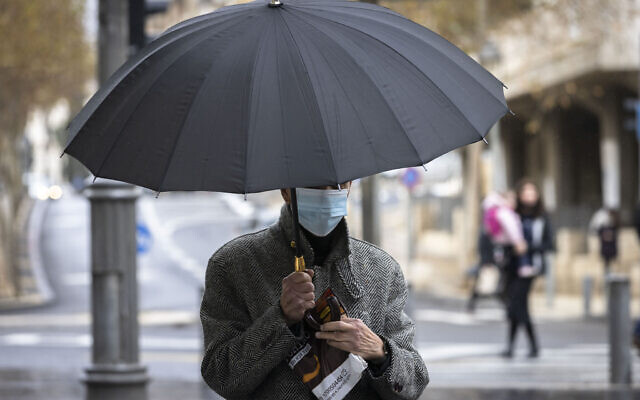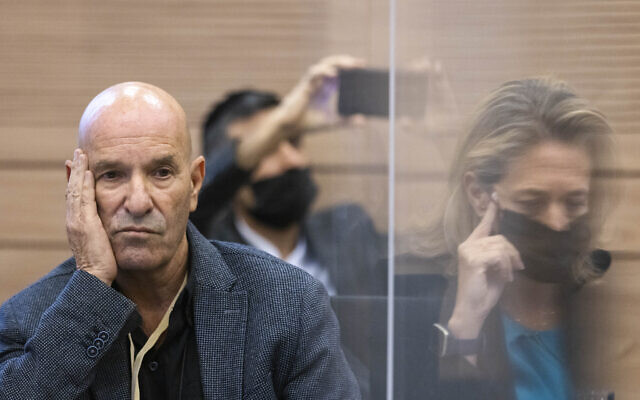Officials looking to fix rules amid fears hundreds of thousands will be sent to quarantine; Liberman: Hysteria worse than virus

Top Israeli officials said Wednesday that the country was bracing for a “tsunami” of Omicron infections to wash over the country in the coming weeks, leaving the government scrambling to deal with the expected onslaught.
Channel 12 news quoted Prime Minister Naftali Bennett as telling close advisers that a massive outbreak would likely hit in the coming days.
“The wave will hit us in 10 days. There will be mass infections, it is not preventable,” Bennett reportedly said. “It will be more powerful, but shorter than, previous waves and last about eight to nine weeks. Everything we knew from previous waves will be different.”
The warnings came as Health Minister Nitzan Horowitz said Israelis over 60 will become the first people in the world eligible for a fourth COVID-19 vaccine shot from Sunday.
“[The recommendation] was made because if we don’t vaccinate the price will be very high — serious morbidity and a lot of quarantine,” Dr. Boaz Lev told a press conference.
“This variant is like a tsunami,” added Lev, who heads the advisory panel that recommended Israel start offering the fourth dose.

Dr. Tal Brosh, another member of the panel, said that it was difficult to make the decision because of a lack of information, both on the severity of Omicron and on the effects of a fourth shot.
“We don’t have a lot of time to make decisions, it’s like a train barreling toward us and we have to decide even when we don’t know everything,” he said. “There is great uncertainty as to whether the coming wave will bring serious illness, but we can’t be naive and think this is a weak virus.”
He said the decision to offer a fourth shot was meant to address the concerns of a specific group and urged the rest of the population to get vaccinated or get their booster shots.
Channel 12 reported that top health ministry official Dr. Sharon Alroy-Preis had on Tuesday advised the government not to go ahead with the fourth shot until research being carried out by the Sheba Hospital was completed, likely in two weeks.
Nevertheless, she ultimately voted with the panel to approve the shot, the report said.
The decision must still be approved by Health Ministry Director-General Nachman Ash.
Hundreds and thousands in quarantine
Channel 12 also reported that there were serious fears that the Omicron wave would paralyze Israel’s economy and education system even if it did not cause severe illness.
Under Israel’s current rules, anybody coming into contact with a person infected with Omicron has to quarantine regardless of vaccination status. This would likely confine hundreds of thousands of people to their homes.

The report said that Health Ministry officials were aware of the problem and currently looking to devise a “more logical” system, but nothing had been formulated yet.
Hysteria worse than virus?
Finance Minister Avigdor Liberman has been one of the most vocal opponents of fresh lockdowns or restrictions.
“My stance is clear — yes to vaccines, no to closing the economy,” he told Channel 12 news. “The most dangerous virus in the world is not the coronavirus, it’s the stress and hysteria.”
On Tuesday he compared Omicron to the flu, drawing a sharp rebuke from Alroy-Preis.
Liberman received a boost on Wednesday when a top South African doctor told Israeli television that the Omicron variant appears much less lethal than the Delta strain of coronavirus.
“People are not dying as you have seen with Delta,” Dr. Angelique Coetzee said in an interview with the Kan public broadcaster. “Delta — it’s totally different.”
Coetzee, who heads the South African Medical Association, said cases have begun to decline since December 9.
הרופאה הבכירה בדרום אפריקה בריאיון ל-@AmichaiStein1: “האומיקרון חלש יותר מהדלתא – אין עומסים של חולים קשים בבתי החולים”#חדשותהערב pic.twitter.com/Tp94PEgUgS
— כאן חדשות (@kann_news) December 22, 2021
“We don’t see that doubling or increase that we had seen right in the beginning,” she said. “Maybe it will be a different picture in the rest of the world, but for now the caseloads in the hospitals are very low.”
She also said there has not been a significant increase in serious COVID-19 cases that is putting a strain on hospitals.
Coetzee stressed, though, that the unvaccinated have been experiencing more “intense” symptoms than vaccinated people who contracted Omicron.
Prepare the vulnerable
Earlier Wednesday, Horowitz said that despite the possibility that Omicron would be milder, Israel still advocated the additional booster shots.
“I pray that Omicron will be less aggressive, but people who are more vulnerable need to be the most prepared,” he said.
Horowitz stressed that the decision was a medical one and not political and said he was fully confident Ash would approve the move. He said data indicated that the effect of the third shot, or first booster, begins to wane after 4-5 months.

The Health Ministry said Tuesday that 170 new cases of the Omicron variant of the coronavirus had been confirmed in Israel, doubling the number of infections.
There have been 341 verified Omicron cases in Israel to date, the Health Ministry said in a statement. Another 807 infections were “highly suspected” to be Omicron cases, but were awaiting verification.
Israel is the first country to authorize a fourth shot.
Israel previously pioneered a third booster shot, rolling it out for at-risk groups before expanding the program to the general population weeks later, before much of the rest of the world. Over four million Israelis have received the third dose, out of 9.3 million people.
Israel’s moves to aggressively combat rising COVID cases came as the Health Ministry also warned that it was seeing a worrying rise in the number of flu cases.
The ministry said in a statement Wednesday that since the start of the flu season 1,088 people had been hospitalized with flu, including 401 children and 70 pregnant women.
The ministry urged everyone six months and older to get a flu vaccine, noting that it could be received together with a COVID shot for those eligible.
As reported by The Times of Israel
